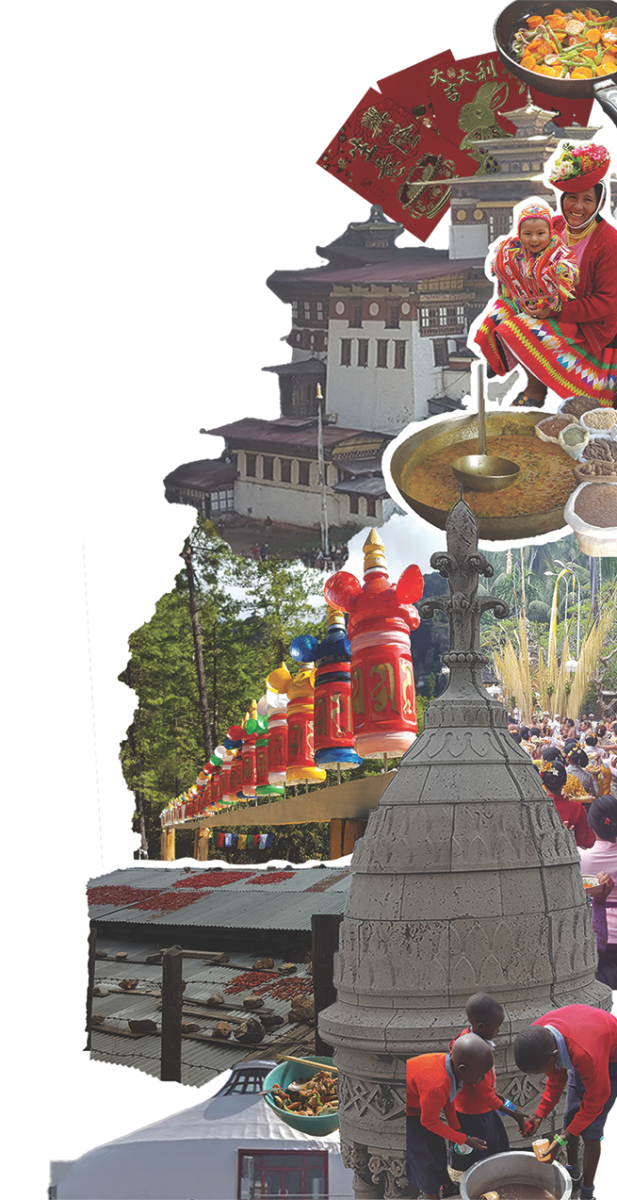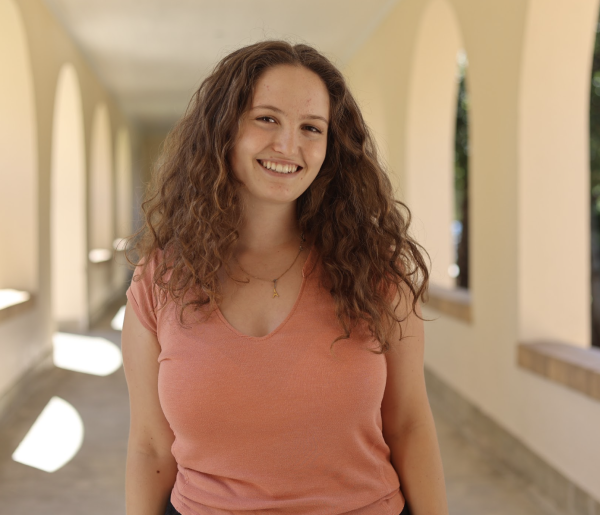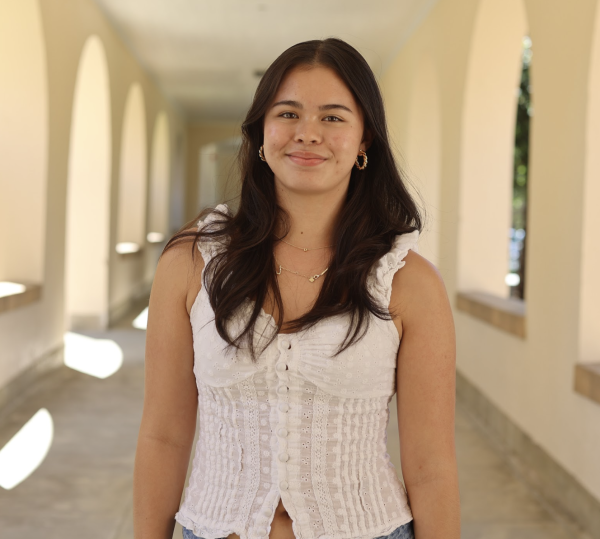Our individual and group identities create who we are and shape our perspectives on family, work and relationships. It is easy to take for granted the opportunities some have in Palo Alto to connect with their families and community. Unbeknownst to most, a large portion of Palo Alto’s population does not have the privilege of their heritage and culture being as accessible.
 Palo Alto has a high population of immigrant families and individuals — over one in three people (34.29%) living in Palo Alto were born in another country according to a 2024 World Population Review report.
Palo Alto has a high population of immigrant families and individuals — over one in three people (34.29%) living in Palo Alto were born in another country according to a 2024 World Population Review report.
Silicon Valley’s vast career opportunities in the technology industry and high-quality public education compel even those who have deeply rooted connections to their home country to immigrate.
Sophomore Arabella Guinle’s family immigrated to Palo Alto from Australia when she was in early elementary school to pursue opportunities in the Bay Area.
“Me and my family have a really close relationship with our home country,” Guinle said. “My family didn’t really choose to live here. My dad got a really good job offer and knew that America was the right place to be to pursue his career, so we followed him. Otherwise, we would still be in Australia.”
While some move to Palo Alto wanting to reside here long-term, others, like Margarita and Francisco Ramirez, do not always have a choice. The couple moved to Palo Alto from the Philippines in the late 1960s so Francisco could attend Stanford graduate school. Initially, they intended to return home after he completed the program, but sudden political unrest in the Philippines upended their plans, forcing the couple to settle down in Palo Alto.
“We were advised by my friends in the Philippines and by [Fransisco’s] mother, who was frantic because she thought that World War III was going to occur, [not to return],” Margarita said. “She said ‘stay and just continue studying until things calm down.’ Well, it was ten years before we felt comfortable enough to go.”
For many immigrants, moving to a new country means leaving behind key components of their identity. Many find it difficult to adopt new customs and languages without partially replacing old ones. After moving from South America to Australia, Guinle’s parents had to choose which language to prioritize teaching their daughter.
“Because my mom is originally from South America and we lived there for about a year or two, [she] raised me speaking Spanish at home, [but] it started to affect my English learning, so I had to stop for a while,” Guinle said.
Not being able to return home after graduate school in Palo Alto was a surprise for the Ramirezes, and Margarita sometimes wonders how their Filipino identity would have evolved if they had returned.
“Growing up in the Philippines, it was stressed that we were not Filipinos,” Margarita said. “It’s only when we were in high school that we began to change our thinking about that or began to understand the political system and the wealth inequities and that kind of thing… If we had stayed there, I think it would have developed. A lot of our friends who stayed there now think of themselves as Filipinos, but we were taken out.”
With work or educational opportunities being driving factors for migrants to come to Palo Alto, many strive to maintain deep connections with their home country and culture. For parents, grandparents or families that moved away from the community that they identify with, passing their culture down through generations often becomes a priority.
Sophomore Arden Zhen connects to her parents’ Chinese roots through family traditions.
“My grandparents are still pretty invested in their culture, so we celebrate holidays like Chinese New Year,” Zhen said. “Also, my grandpa often cooks Chinese food and carries out some of our traditions.”
While inheriting cultural practices and traditions is one way for immigrants to stay connected to their communities, some instead prioritize simply being with family.
In the Ramirezes’ eyes, their home is not the country they grew up in, but the people they made memories with.
“I don’t anticipate that I’m going to go back,” Margarita said. “The people that we care about, that are still there, travel to the United States often and they come stay with us, so there’s no reason anymore.”
For those immigrating without their family, the minimal support system perpetuates negative feelings and obstacles they face while adjusting to new laws, customs, languages and expectations. Even in Palo Alto, an area with a large immigrant population, newcomers often feel a lack of support.
“It’s very hard to be treated the same in certain places because people just don’t understand the struggles and sacrifices immigrant families have to make, and it makes things a lot harder for immigrants,” Guinle said.
Falling back on family connections and friendships from before moving is not always an option. Economic constraints, safety concerns and legal barriers force many immigrants to sacrifice visiting their family and friends in order to pursue opportunities in the United States.
“We have family still living in China but we usually don’t visit very often just cause it’s hard to coordinate everyone’s schedule, [and] it’s also a long flight,” Zhen said.
Even for families with the economic means and availability to travel internationally, some can not visit home. For many immigrants, leaving the United States poses a threat of them not being able to return.
“We are very close with our family who live back in Australia and South America,” Guinle said. “We try to call them often and text them, but we cannot visit them at the moment and haven’t been able to since I was in first or second grade, because we’re in the process of getting a green card — if we went back to Australia or South America, we wouldn’t be allowed back in the U.S.”
In addition to a lack of support, prejudices against immigrants create barriers when finding one’s place in a new community and culture. For Guinle, the stereotypes have been apparent since she first arrived in the U.S. in early elementary school.
“It was pretty easy to make friends when I immigrated to the U.S. because I was pretty young, so I lost my Australian accent and people couldn’t tell that I immigrated by just looking at me, so I wasn’t judged,” Guinle said. “I do still feel judged in some scenarios just [for] being an immigrant.”
Consequently, accessing basic resources needed to build a stable life in the U.S. is a common struggle amongst immigrants.
“Just getting something as easy as a work permit or a driver’s license is five times harder when you’re an immigrant,” Guinle said.
In the face of prejudice, it can be hard to prioritize staying connected to a culture that is not common or respected in one’s community. Ensuring that future generations identify with their heritage often becomes the responsibility of older generations. Margarita prioritized teaching her grandchildren, Melina and Nadia Soberg, how to speak Spanish to achieve this.
“I was determined that I was going to teach Melina,” Margarita said. “So I did and she knew a lot of words, but by the time she was two she was already very verbal in English and I didn’t have the words or the motivation I wanted to communicate with her [in Spanish] and English was the best way to communicate… When Nadia was born, we weren’t really speaking to them in Spanish. It’s hard. It’s amazing now that it’s Nadia, who speaks better Spanish than Melina, and I think that’s because Nadia decided she was interested in it.”
Junior Helena Bondolowski’s parents, who moved their family from Spain to the U.S. in 2008 due to career opportunities, ensure that their family stays connected to their family still living in Spain and Spanish culture.
“Speaking Spanish and continuing our family traditions is a big part of connecting to our heritage,” Bondolowski said.
Balancing the tasks of staying involved in one’s cultural practices and learning to identify with a new community can be difficult for immigrant families. However, old and new traditions do not have to stay separate, and as time passes, some families embrace the ways they connect to their heritage evolving. For Margarita, wanting her grandchildren to identify with their heritage means making space for the history both their mother’s and father’s sides of the family carry.
“With the first generation, meaning Javier and Maripaz, it was much easier because Francisco and I were both from the same culture, but with Nadia and Melina we’re careful about not imposing our culture because we know that there’s another culture that’s important,” Margarita said. “If something happens in a conversation and it reminds me of something, I’ll say, ‘hey, when this happened when I was growing up, this is what my parents would do’, or ‘this is what my parents would say.’”
The expansion of the internet and the diverse population in Palo Alto also allows children to take initiative. Many find ways to stay connected to their heritage after moving by forming relationships with other people from the same areas and cultures.
“I’ve only met about two or three other kids since moving to the U.S. who are from Australia,” Guinle said. “It’s really nice because I can connect with them on a different level. They understand what it’s like to move from a far away country and it’s nice to share common interests and memories.”
While moving to a foreign country can be thought of as leaving culture behind, it is also a chance to make new connections and broaden one’s own identity and sense of belonging.
“I have a much more open mind because I have seen and heard life in a completely different country,” Bondolowski said.
Helping immigrant families feel that they belong in Palo Alto can start by simply extending greater empathy towards immigrants and ethnic minorities’ struggles.
“I’m not saying that people don’t have empathy for people who are immigrating, but I think having a family member who has immigrated here, you realize what a struggle they went through to get here,” Zhen said. “Some of the people who haven’t, they’re viewing like all these people immigrating here [and] they might not realize how hard it was just to get here.”











